Archive for the ‘Hugo Awards’ Category
The Hugo Voter’s Packet was released a little over a week ago. For 24 hours, voters across the globe downloaded, unzipped, transferred to devices, and prioritized.
Out of sheer luck I have already read a few of the Campbell nominees, so down near the bottom you’ll see my links to my reviews of their novels. As I review more Hugo nominated works, I’ll link everything back to this post so it will all be in one place later. Ideally, by July 31, this post will be chock full of links.
Click here for the full ballot, you see how much is on there? holy cow! Ain’t no way I can read all of that by the July 31 voting deadline. Many of these works are available online for free (no Worldcon membership? no problem!), click here for a clickable ballot over at SFSignal. Reading and reviewing wise, here’s what I realistically* think I can get through:
(it goes without saying, but images shown do NOT imply bias, they are just the covers I found quickly)
- The Butcher of Khardov by Dan Wells (Privateer Press)
- “The Chaplain’s Legacy” by Brad Torgersen (Analog, Jul-Aug 2013)
- “Equoid” by Charles Stross (Tor.com, 09-2013)
- Six-Gun Snow White by Catherynne M. Valente (Subterranean Press)
- “Wakulla Springs” by Andy Duncan and Ellen Klages (Tor.com, 10-2013)
Best Novellette
- “The Exchange Officers” by Brad Torgersen (Analog, Jan-Feb 2013)
- “The Lady Astronaut of Mars” by Mary Robinette Kowal (maryrobinettekowal.com/Tor.com, 09-2013)
- “Opera Vita Aeterna” by Vox Day (The Last Witchking, Marcher Lord Hinterlands)
- “The Truth of Fact, the Truth of Feeling” by Ted Chiang (Subterranean, Fall 2013)
- “The Waiting Stars” by Aliette de Bodard (The Other Half of the Sky, Candlemark & Gleam)
Best Short Story
- “If You Were a Dinosaur, My Love” by Rachel Swirsky (Apex Magazine, Mar-2013)
- “The Ink Readers of Doi Saket” by Thomas Olde Heuvelt (Tor.com, 04-2013)
- “Selkie Stories Are for Losers” by Sofia Samatar (Strange Horizons, Jan-2013)
- “The Water That Falls on You from Nowhere” by John Chu (Tor.com, 02-2013)
(edited post July 31st to add that I hardly got anything read past Best Short Story. Yeah, I suck)
Best Related Work**
- Queers Dig Time Lords: A Celebration of Doctor Who by the LGBTQ Fans Who Love It Edited by Sigrid Ellis & Michael Damian Thomas (Mad Norwegian Press)
- Speculative Fiction 2012: The Best Online Reviews, Essays and Commentary by Justin Landon & Jared Shurin (Jurassic London)
- “We Have Always Fought: Challenging the Women, Cattle and Slaves Narrative” by Kameron Hurley (A Dribble of Ink)
- Wonderbook: The Illustrated Guide to Creating Imaginative Fiction by Jeff VanderMeer, with Jeremy Zerfoss (Abrams Image)
- Writing Excuses Season 8 by Brandon Sanderson, Dan Wells, Mary Robinette Kowal, Howard Tayler, and Jordan Sanderson
- Girl Genius, Volume 13: Agatha Heterodyne & The Sleeping City written by Phil and Kaja Foglio; art by Phil Foglio; colours by Cheyenne Wright (Airship Entertainment)
- “The Girl Who Loved Doctor Who” written by Paul Cornell, illustrated by Jimmy Broxton (Doctor Who Special 2013, IDW)
- The Meathouse Man adapted from the story by George R.R. Martin and illustrated by Raya Golden (Jet City Comics)
- Saga, Volume 2 written by Brian K. Vaughan, illustrated by Fiona Staples (Image Comics)
- “Time” by Randall Munroe (XKCD)
 John W. Campbell Award for Best New Writer not-a-hugo
John W. Campbell Award for Best New Writer not-a-hugo
An observant reader would notice I have left the very prestigious “best novel” off of my list of Hugo nominated works to read. Why would I do that? Time and interest. Of the five nominated novels, I’ve read one of them, and I wasn’t a fan of it. the rest of the Best Novel nominees includes an author whose works rarely interest me; an author who does interest me, but I don’t much care for the universe in which this nominated novel takes place; a third book in a series I’m not that interested in; and the entire Wheel of Time saga. With Wot, do I read just the first book? just the last book? the first and the last? all of them? I read the first one years ago, and found it decent, but not good enough that I was interested in continuing. Time and interest: two things I have a very finite amount of.
*definition of “realistically” subject to change
** Some of these I may read selections of.
Retro Hugos?
Posted on: October 26, 2013
Next year the WorldCon will be in London, at LonCon3. I’m pretty excited already to get to nominate and vote in the Hugo awards again. . . and then I saw this:
The Retro-Hugos will use the same rules and categories as the current awards. There will be parallel nominating and voting processes. The eligibility for nomination and voting is identical – if you can nominate or vote for the 2014 awards, you can nominate or vote for the 1939 awards.
How cool is that?? And everyone knows what I like to do in January, right? but seriously. do you guys think this is a brilliant idea, or are you like “meh, whatevs”? If you nominate or vote in the Hugo Awards, are you willing to to give speculative fiction written in 1938 the same attention as speculative fiction written in 2013? Can something that was written back then speak to fans today?
For your reading pleasure, the hardworking folks at LonCon3 have put together lists of novels of 1938, short fiction of 1938, dramatic presentations of 1938, Editors, and more. I imagine (ok, I hope!) that much of the short fiction and novels are available on Project Gutenberg.
I’m pretty geeked about this. Not just because I like reading old stuff, but because I’m curious to see how the fans of today will react to what was considered speculative and cutting edge 75 years ago.
Blackout, by Mira Grant
Posted on: August 1, 2013
- In: Hugo Awards | Mira Grant
- 6 Comments
with this review of Blackout by Mira Grant, I will have finished reviewing all the Hugo nominated novels. Yes, I know voting closed on July 31st, but I did finish Blackout before then, just didn’t get around to writing up the review until now.
Click on the titles to read my reviews of the other Hugo nominated novels, Captain Vorpatril’s Alliance by Lois McMaster Bujold, 2312 by Kim Stanley Robinson, Throne of the Crescent Moon by Saladin Ahmed, and Redshirts by John Scalzi.
published in 2012
where I got it: purchased new
.
.
.
.
.
.
.
.
.
.
.
.
Blackout is the final volume in Mira Grant’s Newsflesh trilogy. This review therefore, is pretty spoilerific when it comes to earlier book in the series, but I’ll try to avoid major spoilers for Blackout. However, all spoilers will be “whited out”, so you can safely scroll around. Wanna know what happens or already know? Just highlight the text with your mouse, and all shall be revealed.
If you’re not familiar with this series, it takes place about 30 years from now, a generation after the zombie apocalypse. The strongest part of Grant’s zombie infected world is the zombie virus itself. It was borne through two independently developed medical miracles that blended together to create a virus that lives within the human body, and awakens when we die. Our minds die, but our body doesn’t. And the only cure for that is a shot to the head. What remains of humanity lives behind high security, blood testing, and weapons training for middle schoolers. The series follow brother and sister news blogging team Georgia and Shaun Mason. Shaun enjoys poking dead things with sticks, and Georgia makes sure everyone knows the truth.
 Captain Vorpatril’s Alliance, by Lois McMaster Bujold
Captain Vorpatril’s Alliance, by Lois McMaster Bujold
published in 2012
where I got it: Hugo Voter’s Packet
.
.
.
.
.
.
.
.
.
The umpteeth entry in her famous Vorkosigan saga, Captain Vorpatril’s Alliance takes place very late in the Vorkisigan chronology, in fact, we only briefly meet the famous Miles Vorkosigan, and he’s semi-retired and chasing toddlers. Never read a Vorkosigan novel, or only read the first one? Have no fear, you really jump in (or back in) at this one. Bujold does her world building in my favorite way – through interactions between characters. Relatives and friends show up from time to time to let everyone know how things are going back home, which also lets the reader know about “back home”, and how it fits into the chronology. There’s no infodumping, just characters have an easy going and often inadvertenly funny conversation.
Right off the bat we meet Ivan Vorpatril, and his buddy Byerly Vorrutyer. These young men are effectively rich wastrels – extra heirs in a hierarchical militaristic society. They have wealthy parents, a title, and maybe some inheritance, but no one expects much from them because they’re so far down the line from the throne. Ivan spends his free time chasing women and promising his mother he’ll settle down one day, and Byerly uses his reputation as an idiot cad to his advantage in his career. It’s easy to think at first that these two playboys are exactly what they seem.
Ivan does a favor for Byerly, and ends up tied to a chair in a beautiful woman’s apartment, while the real kidnappers are breaking through the window. The beautiful woman, Tej, happens to be the on-the-run daughter of a deposed Major House of Jackson’s Whole, a planet on the other side of the wormhole.
In a last ditch effort to protect her from the local authorities, Ivan offers her instant entry into High Vor society, via becoming his wife (in name only of course, with a promise of a divorce once he’s seen her safely to her destination). A few hastily spoken sentences later, and poof: Tej is now Lady Vorpatril. She’s only know Ivan a few hours, but he seems earnest in that he’s just interested in helping her. And besides, if he tries anything (which he swears he won’t), Tej’s blue skinned companion will beat the shit out of him.
Hugo Nominated Novels
Posted on: July 22, 2013
I’ve been reviewing a lot of the other big Hugo categories recently, and now it’s finally time for the nominees for best novel. It’s a nice varied group, including a fantasy adventure from a debut novelist, a nostalgia/homage humor piece, two space operas and a post apocalyptic thriller. An author who wins this award will forever be known as “So and so, author of the Hugo award winning Such and Such! let’s give them a big round of applause!” Future printings of their novel will forever say “Hugo Award Winner”.
yeah, it’s sort of a big deal. You can learn more about the Hugo awards here.
This years nominees for Best Novel are:
- 2312, Kim Stanley Robinson (Orbit)
- Blackout, Mira Grant (Orbit)
- Captain Vorpatril’s Alliance, Lois McMaster Bujold (Baen)
- Redshirts: A Novel with Three Codas, John Scalzi (Tor)
- Throne of the Crescent Moon, Saladin Ahmed (DAW)
The links above go to the novels I reviewed earlier this year, and I’ve got a review for Captain Vorpatril’s Alliance going up in a couple days, hopefully shortly followed by a review of Blackout by Mira Grant. My voting will remain secret, but if you read the reviews carefully I’ll bet you can figure out what I liked the best.
In the meantime, which of these novels have you read? What did you think of them?
- In: Hugo Awards | Jay Lake
- 3 Comments
This closes out my series on reviewing the Hugo Nominated Novellas. For those of you just joining us, here are the other nominees, with links to my reviews:
On a Red Station, Drifting by Aliette de Bodard
After the Fall, Before the Fall, During the Fall by Nancy Kress
The Emperor’s Soul by Brandon Sanderson
The Last Stand of the California Browncoats by Mira Grant
On an alternate earth on the brink of technological change, the holy books have always told people that six thousand years ago The Increate touched the Earth in eight places, and in those places mankind flourished. But photography, larger telescopes, electricity, and the telegraph, have made their appearance. In a society very uncomfortable with chance, a society where history and religion are pretty much the same thing, I imagine this would be more than a little traumatic.
A might happen anywhere, every so often a heresy awakes, something about humanity being older than six thousand years, or having originated elsewhere, or aliens having built the pyramids. You know, all sorts of nonsense. Nonsense which will not be tolerated by either the religious or the secular leaders of the planet. In this, the two groups work together to squash damaging heresies.
Doctor Morgan Abutti, however, has been researching the same section of the sky for years. He’s not sure what he’s found, he just knows it shouldn’t be there. He presents his paper to the the Planetary Society, abruptly shocks his older and more experienced peers out of their chairs, and as one could expect from a scientific society that is ruled by religion, he is summarily thrown out and brought before a treason judge.
I’m working my way through the Hugo nominated novellas! click back a day or two to see my thoughts on the others.
Having escaped the war zone, Magistrate Linh travels with a ship full of refugees to Prosper Station. She has distant relatives on the station, and hopes they will take her in. Of course they will, she’s family, and her mem-implants will prove it, should anyone question who she is. And if they should insist on questioning her Linh is quite used to staring down underlings. She should certainly be able to handle a few cousins who have never even seen the capitol, let alone passed their exams.
On Prosper Station, Administrator Quyen has far more important things to worry about than finding quarters and a job for Linh, and the two women immediately begin to get on each other’s nerves, especially when Linh beings a friendly relationship with a male cousin who is already an embarrassment to the family. Quyen and many members of her family have been left behind on the station, while their more educated spouses have been forced to join the war efforts elsewhere. Quyen and Linh are opposites in every way, and they are both used to be being in control.
But Quyen isn’t alone in her leadership of Prosper Station. She’s aided (or perhaps it’s the other way around) by the Honoured Ancestress, the AI Mind who runs the software and interfaces of the station. The Honoured Ancestress was born to a human woman, but she was never human, she was always designed to be what she is: timeless and in complete control of herself. Except when she isn’t in control. Sometimes she ignores Quyen, sometimes she is silent when Quyen calls for her. Linh hasn’t much experience with AI Minds, but she has her own honored ancestors, those who live in her Mem-Implants, the uploaded minds and memories of her ancestors. They are a connection to her past, honored elders who guide her and remind her of proper manners and mannerisms.
Taking place on the edges of de Bodard’s Xuya universe, “On a Red Station, Drifting” touches on many traditions of China and Vietnam, including bloated and bureaucratic governments, ancestor veneration, and strict social protocols. I found the dichotomy and balance found between futuristic technologies and ancient traditions absolutely beautiful. Quyen is hearing an AI’s voice in her head, yet her home is steeped in tradition, in places quite literally engraved with ancient poetry. I read so much futuristic science fiction where the past is left behind and completely ignored, it was refreshing and comforting to meet characters who live in the future, but keep their deep connections to their past and to their traditions. A perfectly balanced dichotomy.
Hugo nominated novella: The Last Stand of The California Browncoats, by Mira Grant
Posted on: July 9, 2013
- In: comic con | firefly | Hugo Awards | Mira Grant
- 12 Comments
Let’s talk about some Hugo Nominated novellas! click back a day or two to see the whole list, and to click on novellas I’ve already reviewed. Ready for the zombie apocalypse?
San Diego 2014: The Last Stand of the California Browncoats, by Mira Grant
What do you get when you mix a Comic-Con with the zombie apocalypse? You get Mira Grant’s San Diego 2014: The Last Stand of the California Browncoats. If you’re not familiar with Joss Whedon’s breakout show Firefly, fans often refer to themselves as Browncoats in reference to the long brown coat the main character wears in honor of his military service. If you’re not familiar with what a Comic-Con is, we got bigger problems. But that’s another blog post.
It almost sounds like the beginning of a comedy – cosplayers and merchants attend Comic-Con, and give the zombie apocalypse a beat down! But Grant’s novella is anything but a comedy. This is what Mira Grant does: she grabs you by the feels, and does horrible things to you.
San Diego 2014: The Last Stand of the California Browncoats is a stand alone novella that can be read as a prequel to her Newsflesh Zombie trilogy (the third book in that series, Blackout, is nominated for best novel this year). You don’t need to have read any of the Newsflesh books to enjoy The Last Stand . . .
The Last Stand . . . is mostly told as a flashback. It’s thirty years after the event that irreparably changed the world, and journalist Mahir Gowda is interviewing an aging Lorelei Tutt, the only survivor of the 2014 San Diego Comic-Con. She doesn’t want to talk about what happened, but he needs her memories. They talk about other footage from the event, other evidence, and what she witnessed. Along with Lorelei’s story in flashback, we get the POVs from an ensemble of characters who are attending San Diego Comic-Con, including a television actress, a blind journalist, some merchants from the dealer room, and a couple on their honeymoon, among others.
No one is the wiser when Lorelei is sulkily helping her parents and their friends unload merchandise for their booth in the dealer room at the Comic-Con. Fed up with her attitude, her parents send her back to the hotel to have a nap, or a bath, or whatever teenagers need to stop being total brats. The rest of the adults continue setting up the booth and trading geek culture quotes back and forth, and generally annoy their less good natured neighbors.
Elsewhere on the Con Floor, actress Elle Riley is desperately trying to get to her panel, with or without the help of her idiotic handler. Fans ask for autographs, squee at celebrities, compliment costumes, shop for fake weapons, whine about the lack of wifi, try to find the bathrooms. Just a regular day at Comic-Con, right?
Until someone starts coughing. And then someone starts screaming, because the biting and chewing has begun. And then the lights go out. Lorelei’s parents are able to contact her via walkie talkie, but it gets harder and harder to insulate her from the worst of what’s happening inside the locked down convention center. Things get bad, and then they get worse, and then they become unimaginably horrific.
Hugo Nominated Novellas
Posted on: July 7, 2013
- In: awards | Hugo Awards
- 9 Comments
and. . . . we’re back to Hugo stuff!
The nominations for best novella are:
- After the Fall, Before the Fall, During the Fall by Nancy Kress (Tachyon Publications)
- The Emperor’s Soul by Brandon Sanderson (Tachyon Publications)
- On a Red Station, Drifting by Aliette de Bodard (Immersion Press)
- San Diego 2014: The Last Stand of the California Browncoats by Mira Grant (Orbit)
- The Stars Do Not Lie by Jay Lake (Asimov’s, Oct-Nov 2012)
Those links will let you read an excerpt of the novellas.
Boy did I get lucky! I’ve already read and reviewed After the Fall, Before the Fall, During the Fall and The Emperor’s Soul! (Those links will take you to my reviews)
Over the next few days I’ll be posting my reviews of the others.
In the meantime, two conversation prompts:
1. Have you read any of these novellas? what did you think of them?
2. Do you find novellas difficult to access? I meant that in a few ways. Novellas are tough for me because there’s so little time. As soon as I find myself immersed and invested, the story is over. They are super duper short novels. And they are tough to find! Every issue of Asimov’s and most of the other magazines have a novella each month, and many anthologies or author’s collections will feature one or two novellas. But if you don’t read the magazines, or pick up the right anthologies or collections, how else will you get to read novellas?
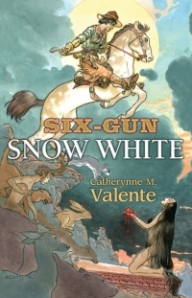
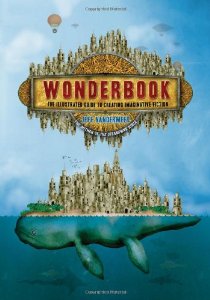


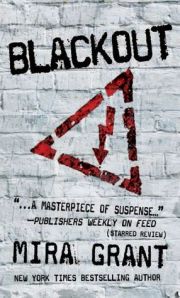
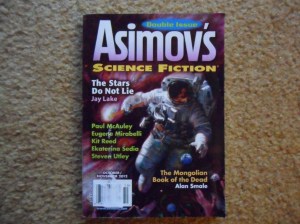
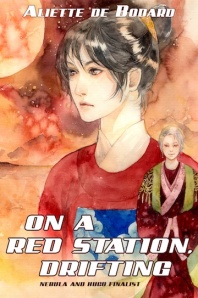


Recent Comments